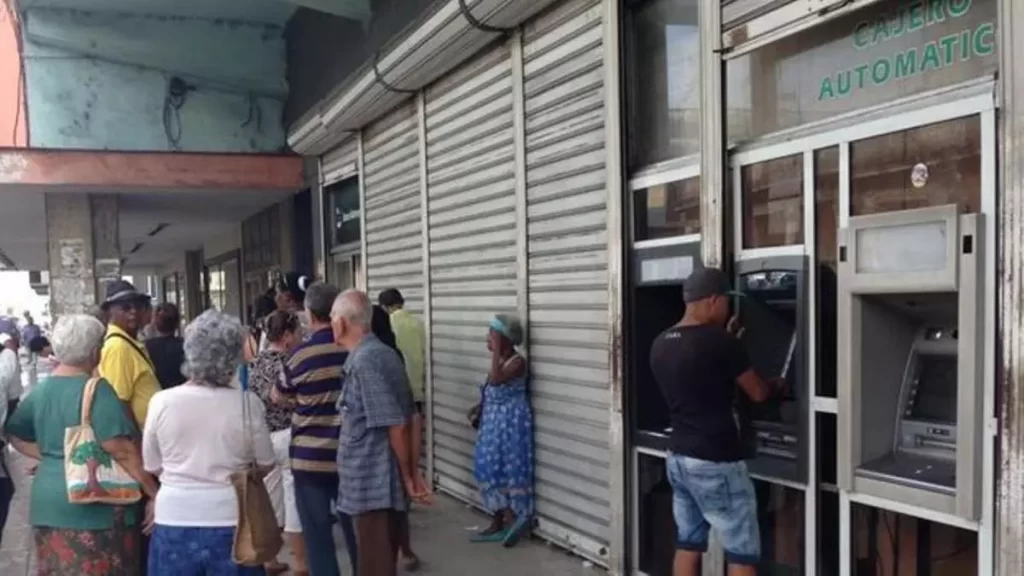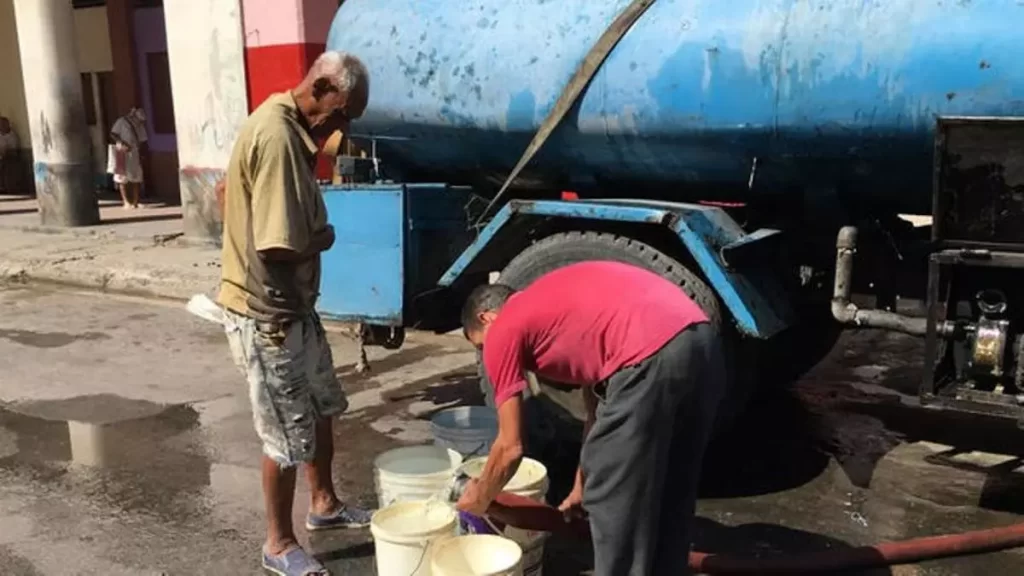To prepare the ground, State TV’s Round Table program – produced by Ideas Multimedios, the same group mentioned in Cubadebate – reviewed on Wednesday some indicators that make clear the bleak panorama. In part: 79.4% of the population has a supply, a total of 8.8 million people – always taking into account the official population data. Of these, 94.8% have intra-home service, 5% have reliable water trucks and 0.07% have easily accessible sources. continue reading
Some 94.8% have intra-home service, 5% have reliable water trucks and 0.07% have easily accessible sources
But in turn, we must break down the data of those who have service in their home, the “privileged,” which amounts to just over 8.3 million people; divided among those who receive it daily, just over 4 million; every other day, 2.1 million; in cycles of three to nine days, 1.6 million people; and, finally, the 566,000 who have it every ten days or more.
But there is still a worse rung on the ladder than the latter, those who do not have any supply service. That group is made up of 535,876 people, 6.1% of the population, who in turn are divided among those who do not have it because of: an “eventuality” (299,000); those with a service cycle greater than 7 days (386,530); those affected by catchment works (79,681); lack of electricity (4,110); and, finally, the large group: those who receive it intermittently in water trucks: 475,404 inhabitants who have water in periods longer than 15 days.
José Antonio Hernández Álvarez, president of the OSDE Agua y Saneamiento, offered all these data in last night’s broadcast and gave details about what the plans are to solve such a serious situation. “The main problems are in the eastern areas of the country, while in the center we have difficulties, especially in some mountainous territories and in the city of Santa Clara. Right now, the number of people affected in Cuba is around 500,000, although well below what was reported at other times.”
According to his explanation, there are three programs underway with investment – no figures provided – to replace the pumping equipment, improve the measurement and change the energy matrix.
“The main problems are in the eastern areas of the country, while in the center we have difficulties, especially in some mountainous territories and in the city of Santa Clara”
The official devoted part of his screen time to regretting that the water supply depends so much on electrical energy and only a few pumping systems have generators. “These systems are located in densely populated areas, but in recent years they have worsened due to their exploitation and present important problems related to the electricity supply,” he said.
Hernández Álvarez explained that these systems, unlike electricity, take hours to recover after a blackout, since the pipes must be filled first and then the pressure rises and is distributed over distances of several kilometers, which complicates the situation. To alleviate this, batteries have been bought that support the generators and that, in his opinion, have moderately improved the problem.
Despite this, the solutions seem to come more from outside, since the official spoke of the “acquisition of pumping equipment,” the response that produces the most impact. “So far, 1,063 pumps have arrived, and we have already installed 803 of them in several areas of Cuba. The arrival of other equipment is expected in the coming months. In addition, we have had success in recovering 733 pieces of traditional pumping equipment since the previous year.”
One of the most common reproaches of citizens is that, since the Ordering Task*, the price of water has risen seven times, an excessive cost for the terrible service received. Hernández Álvarez gave signs of understanding the annoyance but argued that the cost for the entity has increased 16 times and for fuel, 19 times.
“This results in a real cost of more than 200 pesos, while the population only pays about 7 pesos
“The cost of one cubic meter of water is around 70 pesos, and one person consumes approximately three cubic meters. This results in a real cost of more than 200 pesos, while the population only pays about 7 pesos. This affects the company’s liquidity, and at the end of February there are nine companies that are registering losses,” he added.
The conglomerate, created in 2009 and employing about 24,000 workers, was made up of 29 companies of which 24 were in charge of water and sanitation and five of construction activities. Since 2022, two international economic associations, two subsidiary companies and state-run private companies have joined them, one of which “has the task of repairing the sanitary lines inside the homes.”
Leonel Díaz Hernández, general director of the Water Company of Havana, was there to talk about the specific situation of the capital, which has experienced many problems in recent weeks that improved, he said, after the rains at the end of March.
“We continue with the projects related to the use of renewable energy sources, and in the coming months we will acquire two other power generators from solar panels, while we introduce other equipment such as water trucks that work with this type of energy,” he added.
In 2020, the Mission of Cuba to the United Nations responded in writing to a note from the Special Rapporteur on human rights and the environment in which he asked about “human rights and related relations related to water pollution, water scarcity and floods.”
In it, the regime gave all kinds of details about the many measures (plans, programs, legislative incorporations, etc.) taken by the Government to provide water to the population and thus guarantee a service that in 2010 the UN declared “essential for the full enjoyment of life and all human rights.” However, the last three paragraphs were dedicated to holding the United States responsible for limiting the Island’s resources, and this time not because of the “blockade” but “due to the illegal usurpation of our territory by the United States Government, with the imposition, since 1903, of a naval base in the province of Guantánamo.”
The text detailed: “One of the consequences of this illegal usurpation for the full enjoyment of the right to water and sanitation is that we cannot comprehensively manage the surface and groundwater that form in the mountains of the Santiago de Cuba and Guantánamo provinces because they conclude their journey in the occupied area.”
*Translator’s note: The Ordering Task was a collection of measures that included eliminating the Cuban Convertible Peso (CUC), leaving the Cuban peso (CUP) as the only national currency, raising prices, raising salaries (but not as much as prices), opening stores that take payment only in hard currency, which must be in the form of specially issued pre-paid debit cards, and a broad range of other measures targeted to different elements of the Cuban economy.
Translated by Regina Anavy
____________
COLLABORATE WITH OUR WORK: The 14ymedio team is committed to practicing serious journalism that reflects Cuba’s reality in all its depth. Thank you for joining us on this long journey. We invite you to continue supporting us by becoming a member of 14ymedio now. Together we can continue transforming journalism in Cuba.

![]() 14ymedio, Havana, 15 April 2024 — The failure of the Cuban national softball team in the Pan American Tournament of Sincelejo, Colombia, and in the Central American and Caribbean Games in San Salvador, where it did not win medals, will have consequences. “We will take action,” the National Softball Commissioner, Maikel Ibargüen Shue, journalist Guillermo Rodríguez Hidalgo insisted on Radio Rebelde.
14ymedio, Havana, 15 April 2024 — The failure of the Cuban national softball team in the Pan American Tournament of Sincelejo, Colombia, and in the Central American and Caribbean Games in San Salvador, where it did not win medals, will have consequences. “We will take action,” the National Softball Commissioner, Maikel Ibargüen Shue, journalist Guillermo Rodríguez Hidalgo insisted on Radio Rebelde.

















